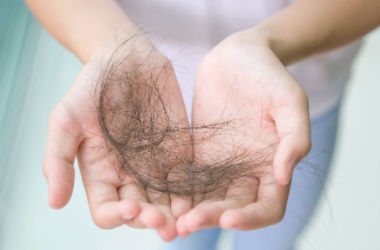General Health
Hair Loss: Top Causes and How to Deal with It
5 min read
By Apollo 24/7, Published on - 26 October 2021, Updated on - 28 January 2024
Share this article
2
171 likes

Human hair goes through three stages: the anagen, catagen, and telogen. The hair grows during the anagen phase and this period lasts for two to four years. It is followed by a transitional period called the catagen phase, where no change occurs. During the telogen phase, the hair gets released from the follicle and then falls off.
We normally lose around 50 to 100 strands of hair in a day. This cyclical loss of hair is normal as the new hair replaces the lost one. However, sometimes the new hair stops growing resulting in temporary or permanent hair loss. Hair fall can be experienced by both the young and old.
Common causes of hair loss
Apart from the natural telogen phase, hair loss can occur due to several factors, some of which include:
1. Family history: Hair loss is usually normal with ageing but some people with a history of hereditary pattern baldness may experience hair loss in their 20s and 30s. It is also known as androgenetic alopecia or male-pattern baldness in men. Women may experience this kind of hair fall after menopause.
2. Nutritional deficiencies: Lack of proteins, vitamin B7 (biotin), and some minerals such as iron and zinc may cause persistent hair fall.
3. Systemic conditions: Some medical conditions such as systemic lupus erythematosus (an autoimmune disease), syphilis (sexually transmitted disease), thyroid dysfunction (hypothyroidism or hyperthyroidism) and hormonal imbalance (estrogen in females and testosterone in males) can result in severe hair fall.
4. Conditions affecting the scalp: Diseases that affect the scalp and result in hair loss include:
- Telogen effluvium: In this condition, about 30% of the hair stops growing and goes into the resting state of the telogen phase. This increases the volume and intensity of hair loss.
- Alopecia areata: It is an autoimmune disease that causes the hair to fall out in one or more small patches. It can be seen right from childhood.
- Tinea capitis: It is a fungal infection of the scalp that causes dry flaky scalp and patchy hair loss and dry flaky scalp. It is highly contagious and is mostly seen in children.
5. Use of some medications: Medications such as beta-blockers and calcium channel blockers (high blood pressure medicines), retinoids (vitamin A supplement), birth control pills, and ibuprofen (painkiller) can result in hair loss.
Recommended Read: Don’t Let Dandruff Irritate Your Scalp
How can hair loss be treated?
Usually, doctors prescribe biotin, vitamin B12, iron and zinc supplements for temporary hair loss. However, some people may require intensive medical treatment to reduce hair fall and stimulate regrowth of hair. The treatment involves:
• Use of minoxidil: Doctors may prescribe minoxidil to stimulate hair growth and prevent further hair loss. This treatment may take 3 to 6 months to show results.
• Microneedling: This procedure involves puncturing the scalp with hundreds of tiny, fine needles to improve blood circulation. Microneedling is often followed by the application of platelet-rich plasma or a corticosteroid that prevents hair fall and improves hair growth.
• Laser therapy: Laser therapy is usually prescribed to people suffering from hereditary hair loss, alopecia areata, and hair loss after chemotherapy. It may take weeks or months to show regrowth of hair.
• Hair transplant: Doctors may recommend a hair transplant to people suffering from permanent hair loss.
Science-backed home remedies to prevent hair loss
Remedies that may help cope with persistent hair loss include:
• Consuming Indian gooseberry: Indian gooseberry, popularly known as amla, is rich in vitamin C, E, amino acids, and phytonutrients that can help strengthen the hair. It is also known to be effective in treating fungal infections of the scalp. Consume amla regularly to reap the benefits.
• Applying aloe vera to the scalp: Studies have shown that aloe vera can soothe itchiness in the scalp and remove the extra sebum, which can otherwise clog the hair follicles and prevent hair growth. One can apply fresh aloe vera gel to the scalp to reduce hair loss.
• Massaging the scalp with coconut oil: Coconut has lauric acid which binds to the hair protein, penetrates in the hair shaft, and protects hair breakage from the roots and strands. Massaging coconut oil into the scalp can improve blood flow and promote hair growth.
• Including carrots in the diet: Carrots are a reservoir of beta-carotene, vitamin A, C, and E and several other antioxidants that help reduce hair loss by improving blood circulation and stimulating hair growth. Add carrots to the salad or drink carrot juice to reap the benefits.
• Use of eggs: Eggs are a great source of proteins, vitamin B12, iron, zinc, and omega-6 fatty acids. These nutrients are known to prevent hair loss and boost overall hair and skin health. Many people use eggs on the scalp as a conditioner.
Conclusion
Depending on the underlying condition, hair loss can be both temporary and permanent. Most cases of hair loss are managed using the required vitamin and mineral supplements. It is advised to reduce the exposure of hair to excessive heating tools and strong chemicals (bleaching or hair colouring). Consulting a dermatologist is recommended in case of persistent or patchy hair loss. You can also opt for a hairfall assessment examination for apt diagnosis.
General Health
Leave Comment
Recommended for you

General Health
9 Benefits Of Consuming Cod Liver Oil Supplements
Discover the benefits and risks of cod liver oil supplements for your health. Learn about the latest recommendations and find out how to choose the right cod liver oil supplement for you.

General Health
Eye Strain & Pain? Check These Blood Markers
Eye strain or pain that doesn’t go away? It might not just be screen time. Learn which blood markers—like Vitamin B12, D, and glucose—can reveal hidden health issues behind your symptoms.
.jpg?tr=q-80)
General Health
IgE Test – Normal Range, Purpose, Procedure, and Results Interpretation
Understand the IgE Test: Learn about its purpose in allergy diagnosis, the simple procedure, normal range interpretations, and what high or low IgE levels might indicate about your health.
Subscribe
Sign up for our free Health Library Daily Newsletter
Get doctor-approved health tips, news, and more.
Visual Stories

The Best Exercises for Controlling Blood Sugar Levels
Tap to continue exploring
Recommended for you

General Health
9 Benefits Of Consuming Cod Liver Oil Supplements
Discover the benefits and risks of cod liver oil supplements for your health. Learn about the latest recommendations and find out how to choose the right cod liver oil supplement for you.

General Health
Eye Strain & Pain? Check These Blood Markers
Eye strain or pain that doesn’t go away? It might not just be screen time. Learn which blood markers—like Vitamin B12, D, and glucose—can reveal hidden health issues behind your symptoms.
.jpg?tr=q-80)
General Health
IgE Test – Normal Range, Purpose, Procedure, and Results Interpretation
Understand the IgE Test: Learn about its purpose in allergy diagnosis, the simple procedure, normal range interpretations, and what high or low IgE levels might indicate about your health.